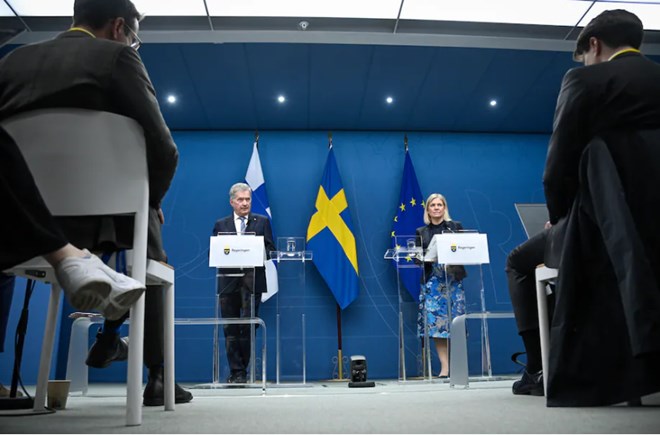
By Emily Rauhala
Wednesday May 18, 2022

BRUSSELS — Finland and Sweden submitted letters Wednesday formally applying to join NATO, a historic moment for two countries that held fast to military nonalignment until Russia’s invasion of Ukraine upended their thinking about security.
The delivery of the letters to the alliance’s Brussels headquarters marks the start of an accession process that could take months but is expected to result in an expansion of NATO from 30 to 32 members, remaking Europe’s post-Cold War security architecture.
Stoltenberg called the applications a “historic step” and said allies will now consider next steps.
Swedish Prime Minister Magdalena Andersson and Finnish President Sauli Niinisto of Finland are scheduled to appear Thursday at the White House, where President Biden is expected to show his support.
NATO officials and several allies have signaled that Finland and Sweden could expect protection in the period before their membership is fully ratified and they are part of NATO’s collective defense pact, known as Article 5.
A big question is whether Russian President Vladimir Putin will retaliate. European officials and diplomats said Finland and Sweden are prepared for hybrid or clandestine attacks.
Putin cited the threat of NATO expansion among the rationales for his unprovoked invasion of Ukraine. Kyiv is not on track for NATO membership, but Putin’s war has resulted in a reinvigorated alliance that is now poised to double its land border with Russia.
The two new members would bring NATO’s full force to the far north and bolster its presence in the Baltic Sea region. The alliance would gain two sophisticated militaries with deep experience operating near Russia’s frontier. Sweden also holds the strategically important island of Gotland, just 200 miles from the Russian military in Kaliningrad.
Finland and Sweden didn’t consider themselves neutral before
now. Militarily, they have been close NATO partners. Politically, they are
members of the European Union.
But thinking of themselves as nonaligned militarily has been an important part of their self-conception. Before Russia’s invasion of Ukraine, a majority of people in both countries said it was safer to be outside NATO. But the past months have seen a dramatic swing in public opinion.
“We are leaving one era and beginning another,” Sweden’s Andersson said Monday, announcing the decision.
“This is an extraordinary development given where we were in February,” said Anna Wieslander, director for Northern Europe at the Atlantic Council think tank.
“Russia wanted to turn back time, to go back to the Cold War, to fragment and weaken the West,” she continued. “Now, in May, we are here.”
After receiving the applications, NATO will convene its decision-making body, the North Atlantic Council, to decide whether to move forward with the request. Then there will be accession talks, said a NATO official who spoke on the condition of anonymity according to the alliance’s ground rules.
This first phase of the accession process is expected to be swift, largely because both countries are already close NATO partners. From there, it could take “months” for each member state to ratify the decision, the official said.
Turkish President Recep Tayyip Erdogan voiced skepticism last week about Sweden and Finland’s accession, but NATO officials and analysts say Turkey will fall in line. “We are determined to work through all issues and reach rapid conclusions,” Stoltenberg said Wednesday.
Russian officials have warned of “consequences” at every step but have offered more muted rhetoric in recent days.
Putin said Monday that Finland and Sweden’s entry into NATO did not represent an imminent danger to Russia, but he warned that a military buildup in either country could change that assessment.
“Russia has no problems with Finland and Sweden, and in this sense, expansion at the expense of these countries does not create an immediate threat for us,” he said in televised remarks on Monday. “But the expansion of military infrastructure into this territory will certainly provoke our response.”
“What it will be, we will look at based on the threats that will be created for us,” he continued. “We will respond accordingly.”
In a weekend telephone call, Putin told Finland’s Niinisto that the decision to join NATO was “wrong” and could have “a negative effect” on Russian-Finnish ties, but he did not make specific threats, according to accounts of the call.
NATO and European officials have for the most part downplayed
the risk of significant Russian aggression.
The country’s military remains tied up in heavy fighting in Ukraine and has lost soldiers and equipment. Russia also withdrew troops from the border with Finland to fight in Ukraine, leaving Moscow with a reduced capacity to target the border militarily.
Given widespread support for the Nordic countries’ NATO accession, it will be difficult for Russia to influence their populations.
“There is no place to intervene, there is no ground to make people change their minds,” said Henri Vanhanen, a foreign policy expert and adviser to the center-right National Coalition Party in Finland. “This is the democratic resilience we have against Russia.”
“It is out of Russia’s reach right now to try to stop Finland and Sweden from joining NATO,” he said. “It has to come to terms with it.”
If Putin does try anything, allies have pledged support. Britain, Denmark, France, Iceland and Norway are among countries that have promised military support should either Finland or Sweden come under attack. “Whoever would seek to test European solidarity by threatening or attacking their sovereignty, through whatever means, must be certain that France will stand shoulder to shoulder with Finland and Sweden,” according to a French statement released Monday.